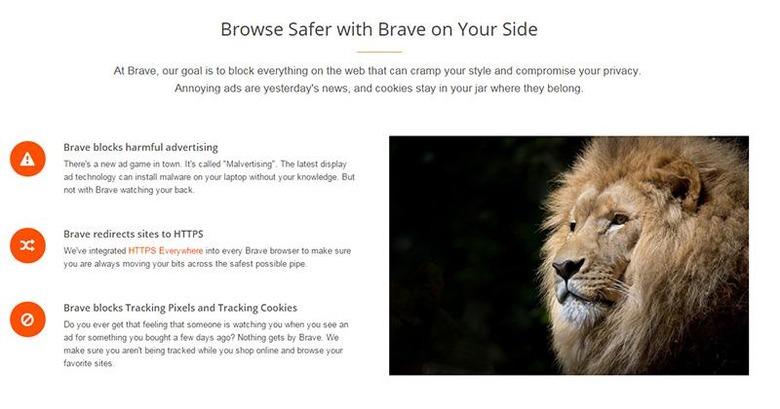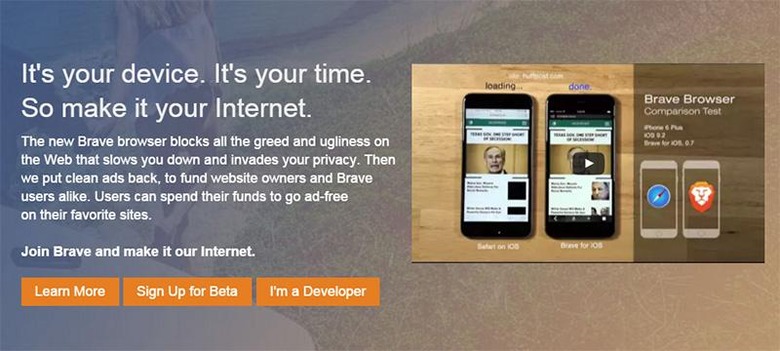"Brave" New Browser Wants To Profit From Every Site You Visit
This morning I woke up and did what I do to start my weekday mornings; I read the news. One of the most interesting pieces I read was about a new internet browser being developed by the co-founder of Mozilla. That alone is pretty interesting stuff, but as I read further into it, I realized that Brendan Eich has completely lost touch with reality.
Let's back things up a bit, and talk about how the internet works. No, I'm not talking about "a series of tubes" or anything. I'm talking about how content is produced and delivered to people everywhere. I've written for a number of websites, and the story is the same pretty much anywhere you find content.
Someone (or a team of someones) will produce the content, and upload it. People will then load the content up, and will see a few ads as they take it in. For the reader, that's all there is to it. However, on the back-end, a company will pay the content creators for displaying the ads. This provides the means to keep the servers running that host the content, as well as to pay the people for actually creating it.
This relatively simple process is what allows the internet to thrive with free content. Think about how many websites you had to pay for, that you visited today. Aside from Netflix, I can't think of a single place I go online regularly that I am required to pay money in exchange for visiting and looking at their content.
With the rise of ad-blockers, the internet has become a battlefield similar to the one described in The Matrix. Was it the advertisers that started getting greedy with their auto-playing pop-up ads? Or did ad-blockers force their hand into finding new ways to make the most money off of an advertisement? Regardless of who struck the first blow, I'm sure there are a few pieces of common ground that we can all find.
First, no one likes ads that play music or sound when you visit a website. Second, no one actually wants to pay money to every website that they visit, in order to see their content. So this is where Brendan Eich, co-founder of Mozilla comes in with his new browser.

The new browser goes by the name "Brave" which is probably a good name. I could think of a few others that might be more fitting. So what could an internet browser do that would upset this balance so completely? You might think that I'm going to tell you that it simply blocks all ads. It does that, but it also goes a step further into lunacy.
In addition to simply removing all ads, it also removes any other page elements that might track what you're doing on the web. So now we have a browser that won't show you ads, and keeps all of your browsing anonymous. Okay, so aside from publishers getting no money from advertising, that still doesn't seem so crazy. But there's one other tiny detail to look at.
In place of those ads that the browser strips out, Brave will display it's own ads. That's right, if you browsed SlashGear with the release version of Brave (the browser is currently in beta) you would still see ads, but none of the ones from the advertising networks that we work with. So where does all of that money go? I'll let you guess.
That's right, Brave will be showing its own ads, and making money off of every single website that you visit. Eich says that the company will only keep 15 percent of that revenue, with the publishers getting 55%, ad publishers getting 15%, and the user getting their own 15% cut.
Now, you're probably thinking "hey, publishers get 55% of the ad money, so what's the big deal?" The big deal is that we don't know how much these ads pay. What if that 55% cut is less than half of what a site's own ads pay? Plus, if an ad network sees that you're not getting enough hits, they might drop you, or cut your rates. So now you're making less money on the traffic from Brave users, and even less money on people using Chrome or Firefox, because your ad network dropped you.
But let's not even look at those percentages. Because to even consider those, you have to believe that the company behind Brave will work with each and every website on the entire internet, in order to supply them with their cut. That is a completely impossible task. Sure, they'll probably work out deals with big name sites, but if you're a little fish in the pond, how likely do you think it is that they'll give you the time of day? After all, there are more than a billion on the internet, and millions of those will be wanting their cut from Brave.
So what happens to all of the sites that you visit using Brave, that don't have a deal secured with them? Well, the company hasn't said anything about it yet. However, it seems likely that they're going to operate as usual, only they'll pocket that extra 55%. After all, it's free money, so why not?

Now why would someone choose to use Brave, instead of some other browser? After all, it looks like they might be doing some shady things. Well, the way they sell it, they're already telling you that the publisher is getting most of the money. So already, they look like pretty good guys. Second, they're talking about paying you to surf the web. You get 15% of the money that's earned from every ad you see. Now you've finally got that work-from-home job that you've always wanted!
It's easy to realize that you won't actually make any kind of money, no matter how much time you spend online with this browser. Other news outlets have described this income as something you can use for "micropayments" on various sites. Just think about that for a moment. 15% of the money generated by a user browsing for an unknown amount of time is enough for some tiny payment. With that in mind, you can't imagine that a 55% cut does much of anything for the sites that you're browsing.
You might wonder what kinds of ads you'll see when you're using this Brave new browser. Despite the fact that they're ripping out all of the nasty tracking that websites can do, they're actually tracking all of your browsing, and using that information to show to you targeted ads. But it's okay, because they're a browser, and not a nasty website tracking that information. So it's totally different, and way better.
In short, the pitch sounds good. You use their browser, and you only get a few ads that they claim will be unobtrusive. You'll also get a kickback for using them, and publishers still get most of the money. Everyone wins when it comes to Brave.
Unfortunately, Brave will never be able to achieve their lofty goals. They will never be able to provide every single website with the means to collect on that 55% profit that they're willing to share, and they will essentially be stealing money from publishers large and small.
They may have gone with "Brave" for the name, but I think "Malware" would be a better term. After all, what do you call a piece of software that injects ads into your browsing experience that weren't meant to be there in the first place? You certainly don't call it "Brave" for doing so.
